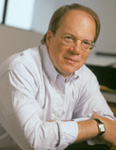 Wisconsin Lawyer
Wisconsin Lawyer
Vol. 82, No. 5, May 2009
by George C. Brown, executive director
 Back in the 1960s, when my dad was in his 50s and I still dreamed of the day I got my driver’s license, every night after the dinner dishes had been cleared I saw my dad peel back the pages of the Chicago Tribune, perusing the headlines and reading the occasional story of interest. He always read the obituaries. No pictures, then, unless you were really famous. Just the names and abbreviated life stories. Every once in a great while, Dad would murmur, maybe shake his head slowly, and say something like, “poor Dick” or “poor Leo, we played handball together down at the park.”
Back in the 1960s, when my dad was in his 50s and I still dreamed of the day I got my driver’s license, every night after the dinner dishes had been cleared I saw my dad peel back the pages of the Chicago Tribune, perusing the headlines and reading the occasional story of interest. He always read the obituaries. No pictures, then, unless you were really famous. Just the names and abbreviated life stories. Every once in a great while, Dad would murmur, maybe shake his head slowly, and say something like, “poor Dick” or “poor Leo, we played handball together down at the park.”
Then, I never understood the ritual. These were just some old guys I had never met or even heard of. Today, I understand. A couple of months ago, reading the morning paper, perusing the headlines between bites of my English muffin with far more jam than is good for me and sips of the day’s first cup of coffee, I was reading the obituaries like I always do. And a name and face jumped off the page. John Lederer had died.
Many of you knew John. More of you probably did not. John was active in the State Bar, and though he ran for president, he never served on any of the governing bodies. But John played a crucial role in the professional lives of every lawyer in this state and probably this country.
John was what today we call an early adopter of technology in the law office. He was on the “bleeding edge” of moving law offices into the technology age. For many years he chaired the State Bar’s Technology Resource Committee (TRC) and served on it even longer. The first WisBar, a dial-up bulletin board service (BBS) that was predecessor to the current WisBar Web site, was created while John was a TRC member. The BBS was managed by the teenage son of Attorney Jim Jaeger, another TRC member, out of his bedroom. In 1991, the TRC’s subcommittee on statutes on disk struggled with determining the best way to provide the statutes electronically and began the discussion on how best to make case law available electronically and portably. At the time, only Lexis and West had case law available electronically, but their services were tied to mainframe computers and were very costly. Most lawyers, even the technologically savvy ones, still used books for most research.
By early 1993, while John was TRC chair, the Law on Disk Subcommittee was wrestling with an issue that today seems to be a no-brainer: how to cite a case so as to allow publication of case law in electronic form without worrying about copyright violation. At the time, West owned the copyright to the case citation format and prohibited its use without significant licensing fees. The subcommittee, chaired by Robert Hagness of Mondovi, included Rex Ewald of Monroe, Clyde Wynia of Marshfield, and John Lederer. By the time their report was adopted by the State Bar Board of Governors in 1994, the group would grow to include Chuck Blumenfield of Milwaukee, Marcia Koslov (the State Law Librarian) Bruce Munson (the Revisor of Statutes) and Jon Wilcox of Elm Grove, as well as Marilyn Graves, the Supreme Court clerk, and Jim Fullin, the Judicial Council executive secretary.
The creation of this alternate citation system or uniform or universal citation system that is vendor-and-media neutral allowed the development of the numerous, relatively inexpensive case-law databases in use today nationwide. Although Wisconsin did not adopt universal citation until 1999, enough states did so early on that vendors like Law Office Information Systems (LOIS) could develop low-cost alternatives to the major providers. It is safe to say that without universal citation, FastcaseTM, the free legal research that you enjoy as a member of the State Bar, would be much more expensive, undoubtedly not free, and maybe not even available. Would some form of universal citation have eventually been created? Probably. But, without John’s leadership, and the hard work of so many volunteers, it probably would not have been created by Wisconsin lawyers for the world.
Wisconsin Lawyer
